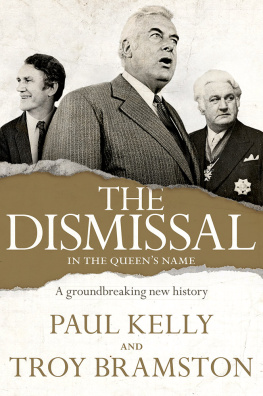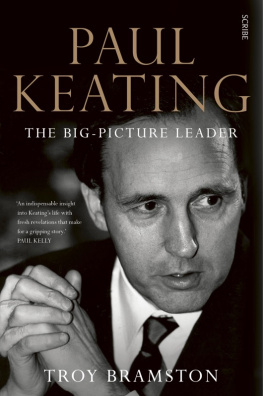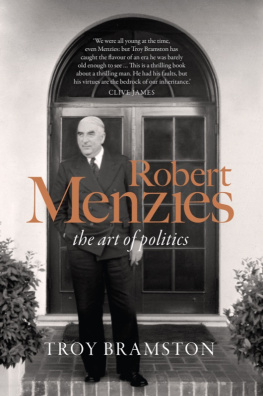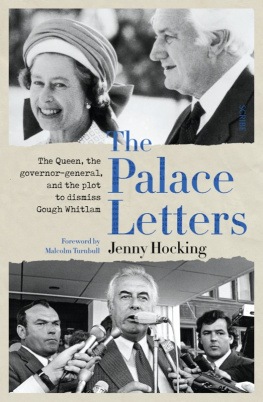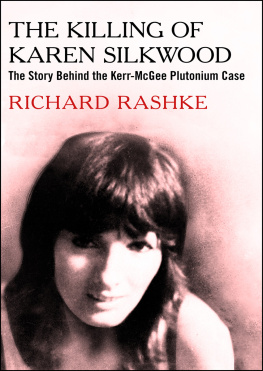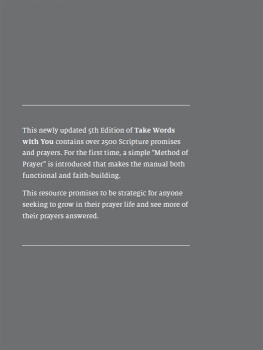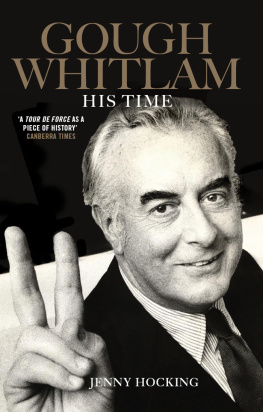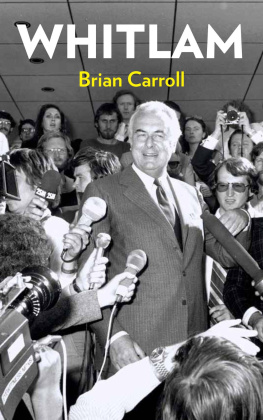This book benefited by being able to draw upon nearly forty new interviews with many key players in the events of October-November 1975 from many vantage points. Some interviews conducted several years ago are used here for the first time. Other interviews by the authors are being republished and are included in the endnotes.
For agreeing to new interviews, the authors would like to thank: Tony Abbott, Doug Anthony, Sir Gerard Brennan, Dale Budd, Rod Cameron, Jimmy Carter, Peter Costello, Bernard Donoughue, Alexander Downer, Tony Eggleton, Bob Ellicott, Robert French, Graham Freudenberg, Vic Garland, Murray Gleeson, Bob Hawke, Bill Hayden, Sir William Heseltine, John Hewson, John Howard, the late Sir Kenneth Jacobs, Paul Keating, David Kemp, Tom Lewis, Geoffrey Lindell, John Mant, Don Markwell, Doug McClelland, Brendan Nelson, Andrew Peacock, Dennis Pearce, Gordon Scholes, Michael Sexton, Ian Sinclair, Sir David Smith, Tony Staley, Sir Laurence Street and Malcolm Turnbull.
In researching and writing this book, we drew on many new archival documents, including some held in private collections. Several documents are published in these pages for the first time. We wish to especially thank Dale Budd, Tony Eggleton, Nicholas Hasluck and Don Markwell for providing us with access to their personal papers.
Andrew Cairns at the National Archives of Australia was always prompt in responding to our very many queries and helpful in getting new material, particularly from Sir John Kerrs papers, cleared for access. Elizabeth Masters assistance in sourcing photos from the National Archives collection was invaluable. We also made use of personal and official papers held in the National Archives of Sir Garfield Barwick, Malcolm Fraser, Gough Whitlam, Sir Clarence Harders, John Menadue, Sir Geoffrey Yeend and the staff of the departments of Prime Minister and Cabinet and Attorney-Generals.
We appreciated the assistance provided by the staff of the National Library when accessing the personal papers of John Menadue, Sir Anthony Mason, Sir William Heseltine and Geoffrey Sawer. Marian Hanly and Duncan Felton at the National Library were helpful in facilitating our access to oral history interviews with Sir John Kerr, Malcolm Fraser, Sir Clarence Harders, Reg Withers and Sir Billy Snedden, among others. We also looked through the papers of Sir Roden Cutler at the State Records Authority of NSW, at Kingswood.
The personal archives of Gough Whitlam and Malcolm Fraser were invaluable for this book. We owe a special debt of gratitude to Katie Wood for helping us to navigate the Malcolm Fraser Collection at University of Melbourne; Lorraine West at The Whitlam Institute located at Western Sydney University; and Pixie Stardust for providing documents from the Bob Hawke Collection at the University of South Australia.
At The National Archives of the United Kingdom, we were able to access several documents from the Prime Ministerial Office files of Harold Wilson and also the Foreign and Commonwealth Office files, including material from the United Kingdom High Commission in Canberra.
We benefited from the valuable assistance, editorial advice and suggestions of many people, including: Hollie Adams, Michele Bramston, James Curran, Elena Douglas, Philippa Ellis, Malcolm Farnsworth, Josh Frydenberg, Margaret Kelly, Michael Kirby, Greg McIntosh, John Menadue, Chris Merritt, Linda Scott, Brett Odgers, Nicky Seaby, George Williams and George Wright.
We appreciated the support and encouragement provided by our colleagues at The Australian, including Chris Mitchell, Clive Mathieson, Michelle Gunn and Milan Scepanovic.
Penguin Random House was immediately enthusiastic when we began discussions about this book in detail earlier this year. Our many thanks goes to Ben Ball and his team, especially Arwen Summers, Rebecca Bauert, Heidi McCourt and Alysha Farry.
VIKING
UK|USA|Canada |Ireland|Australia
India|New Zealand|South Africa|China
Penguin Books is part of the Penguin Random House group of companies
whose addresses can be found at global.penguinrandomhouse.com.

First published by Penguin Australia Pty Ltd, 2015
Text copyright Paul Kelly and Troy Bramston 2015.
The moral right of the authors has been asserted.
All rights reserved. Without limiting the rights under copyright reserved above, no part of this publication may be reproduced, stored in or introduced into a retrieval system, or transmitted, in any form or by any means (electronic, mechanical, photocopying, recording or otherwise), without the prior written permission of both the copyright owner and the above publisher of this book.
Cover design by Adam Laszczuk Penguin Australia Pty Ltd
Text design by Samantha Jayaweera Penguin Australia Pty Ltd
Cover photographs: Gough Whitlam: Guy Wilmott/Newspix; Malcolm Fraser: News Ltd/Newspix; John Kerr: News Ltd/Newspix
penguin.com.au
ISBN: 978-1-76014-203-2
The dismissal is the most dramatic event in Australias political history the moment when our parliamentary institutions and constitutional system were put under their greatest strain. Gough Whitlams political death in the afternoon of 11 November 1975, dismissed by Governor-General Sir John Kerr, was caused by a cocktail of ruthlessness, incompetence and deception. Forty years later, when the passion and tumult have died, there is a fundamental truth: this was a highly unsatisfactory solution for Australian democracy.
The dismissal was a monumental train wreck, in its prelude, its execution and its consequences. Neither inevitable nor necessary, it was inferior to other options available to resolve the four-week parliamentary deadlock. The crisis can only be understood in terms of the ambition and character of its principals: Whitlam, Kerr and Malcolm Fraser. As Kerrs predecessor, Sir Paul Hasluck, later told Buckingham Palace: The wisdom of a constitutional monarchy is to avoid confrontation. Australia in 1975 failed this test.
The rage and delight about 1975, depending on your perspective, has expired. But the story has not settled. The passage of four decades has not brought reconciliation over these events. A permanent chasm still exists among the different interpretations of what happened, why it happened and who carries the blame. The dismissal sits on our historical landscape like a gigantic expended yet unexplained volcano. It is too big to forget but too lethal for a settlement.
As the Queen, in blissful ignorance, slept in her bed in Buckingham Palace, the governor-general used the Crowns power to terminate the prime ministers commission in Canberra. Kerr acted in the Queens name but one could not expect the Queen to have taken such action herself. This crisis was about the exercise in Australia of the royal prerogative without warning.
It was one of those rare occasions when the Crowns intervention was decisive in settling a great contest. The governor-general called his memoirs Matters for Judgment. This was Kerrs call; it was Kerrs test; it was Kerrs judgement. He had the power and the influence. Yet Kerrs solution changing the government at the stroke of a pen divided the nation, embittered the politics and compromised our institutions.
No matter how many people try to evade the issue, the final responsibility can rest only with Kerr as governor-general.

